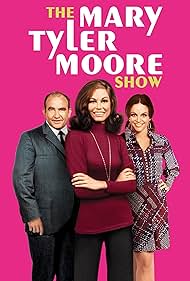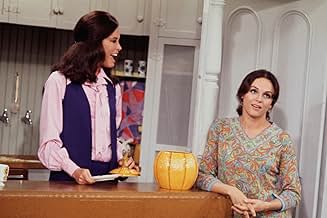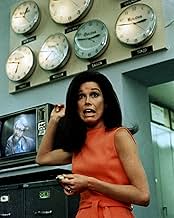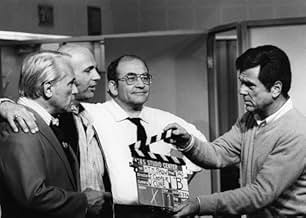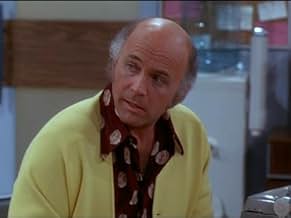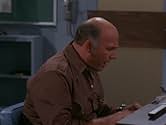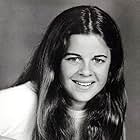The lives and trials of a young single woman and her friends, both at work and at home.The lives and trials of a young single woman and her friends, both at work and at home.The lives and trials of a young single woman and her friends, both at work and at home.
- Won 29 Primetime Emmys
- 46 wins & 82 nominations total
Browse episodes
Storyline
Did you know
- TriviaProducers wanted "someone like Betty White" to play Sue Ann Nivens. Eventually, someone asked, "Why not cast Betty White?"
- GoofsIn the first season installment "Divorce Isn't Everything", Mary mentions that she can't speak French but can speak Spanish. Later in the series, while at a Mexican restaurant, she indicates that she can't read the menu because she took French in college.
- Quotes
Lou Grant: You know, Mary, you've got spunk.
Mary Richards: Why, thank you, Mr. Grant.
Lou Grant: I hate spunk.
- Crazy creditsIn episode 71 the MTM Kitten was replaced by Miss Moore herself, saying "Th-th-th-that's all folks!", a line spoken by Mary Richards during that episode.
- ConnectionsFeatured in The 23rd Annual Primetime Emmy Awards (1971)
Featured review
It's hard for people to remember what American TV was like at the time (even for people who were alive and conscious then) in the hugely formulaic post-PETTICOAT JUNCTION era.
And I've known a lot of people who today look at the first season of "MTM" where the jokes are broader and don't always quite work and the acting is a bit too "loud" and stagey, and they wonder why this show was so well-regarded, then and now --- often to the point that they can't make it thru to later seasons.
I guess that's understandable. It's hard to believe very-very early episodes of "MTM" about Mary and Rhoda joining a divorce club and its strained humor was actually looser and freer and more amusing than what other sitcoms of the day had to offer. But it's true.
Although the first year of the show may be only sporadically humorous, it makes up for it in that "MTM" did one of the best jobs of capturing that weird melancholy of the era --- that mood that kind of defined the '70s, and was even more intense at the very start of the decade: this sort of lost, disillusioned, bittersweet, post-60s flavor which made everybody immediately seem as if they had a "past" from the moment they appeared on screen...
For anybody looking to see what it actually felt like living in the world at that particular moment in time -- at the cusp of the '60s and '70s -- it's captured vividly by such period montage sequences as the urban street scenes in MIDNIGHT COWBOY (1969) or the snow angels/ice skating sequence in LOVE STORY (1970) or the "MTM" show opening theme design from Season 1, even Mary and little Bess going shopping in a Minneapolis mall, etc...
The world actually felt that way at the time. It's not just a Hollywood construct.
To me, Season 1 of "MTM" is kind of a portal to 1970. I regarded it as such even as early as the late-70s (when the show was first in syndication) and it still hits me the same way whenever I see very early installments--- the look of the show and the forlorn music score... No, the comedy isn't quite as hilarious by the slick standards of sitcoms from more recent decades (or even compared to later episodes of the same show) but I still find the mood almost heart-breakingly captivating. It is so evocative of the era.
As the seasons rolled on, the comedy got sharper (by the standards of the day) even though that '70s somberness was gradually mitigated as it lessened in real life.
So it's a time capsule of sorts... One would think every show and movie filmed in a particular era would be, but that just isn't true. Clothes and cars from a period don't sell or convey the past to the present --- something has to be good, or at least right-minded, in order for the zeitgeist of the era in question to stick to celluloid. And "MTM" was one of those shows that did so.
It was also one of the rare series then to proceed in "real time" which gave the show a life, an energy, that most didn't have, even though it didn't delve into the then-shocking, in-your-face politics that ALL IN THE FAMILY soon would.
Folks who weren't around then probably aren't able to grasp how fresh this "MTM" show seemed back in 1970, given where TV was at the time. Or understand why all the terribly broad (some might even say groan-inducing) comedy directed at, and derived from, Ted Baxter during Season 1 -- which predominantly focused on his dumbness and inability to pronounce basic words -- could possibly ever have been once seen as "funny".
In fact, it was, however briefly, fall-off-the-couch funny. TV in the 1960s had fervently ignored the social changes of that decade (including the questioning of establishment authority) so seeing a revered image like the silver-haired newsreader held up as a buffoon was actually considered edgy, even though that context doesn't really "read" today. (That's not revisionism, I swear. And at least the writers realized they would soon have to write to Ted's narcissism and density in a more layered, sophisticated fashion, and they quickly did so.)
That says more about where the media culture was circa 1969 or 1970 than it does THE MARY TYLER MOORE SHOW.
For all of the above reasons, Mary Richards became metaphorical for the early-to-mid 1970s, almost by accident: TV changed more between 1970 and 1975 than any other five year period in its history, in terms of content, and the television sitcom genre had literally become an agent for social change. And Mary Richards likewise grew during the seven years of the series from the quivery, vulnerable, lanky girl with the long, raven hair who let herself be gently bullied into giving up her family holiday visit at Christmas to cover for her co-workers in that 1970 episode (so wistfully forlorn for reasons hard to explain, except that it, too, captures the poignant atmosphere of the time precisely) into the almost cocky, seasoned professional who didn't pause to deliver a zinger to Ted or SueAnn when circumstances demanded it, and could grab and kiss her latest boyfriend in a public restaurant and then fluff her hair tauntingly at her voyeuristic co-workers as she sauntered out the front door.
Mary had grown up with us, or at least with the television medium, during it's most significant period of progression.
And then there's the actress herself, Mary Tyler Moore, whose own personal melancholia seemed to parallel that of the earlier part of that decade. Even with the same writers and co-stars, the show would never have felt the same without Moore and her intrinsic sense of haunted, detached nostalgia wrapped in winter's chill.
And I've known a lot of people who today look at the first season of "MTM" where the jokes are broader and don't always quite work and the acting is a bit too "loud" and stagey, and they wonder why this show was so well-regarded, then and now --- often to the point that they can't make it thru to later seasons.
I guess that's understandable. It's hard to believe very-very early episodes of "MTM" about Mary and Rhoda joining a divorce club and its strained humor was actually looser and freer and more amusing than what other sitcoms of the day had to offer. But it's true.
Although the first year of the show may be only sporadically humorous, it makes up for it in that "MTM" did one of the best jobs of capturing that weird melancholy of the era --- that mood that kind of defined the '70s, and was even more intense at the very start of the decade: this sort of lost, disillusioned, bittersweet, post-60s flavor which made everybody immediately seem as if they had a "past" from the moment they appeared on screen...
For anybody looking to see what it actually felt like living in the world at that particular moment in time -- at the cusp of the '60s and '70s -- it's captured vividly by such period montage sequences as the urban street scenes in MIDNIGHT COWBOY (1969) or the snow angels/ice skating sequence in LOVE STORY (1970) or the "MTM" show opening theme design from Season 1, even Mary and little Bess going shopping in a Minneapolis mall, etc...
The world actually felt that way at the time. It's not just a Hollywood construct.
To me, Season 1 of "MTM" is kind of a portal to 1970. I regarded it as such even as early as the late-70s (when the show was first in syndication) and it still hits me the same way whenever I see very early installments--- the look of the show and the forlorn music score... No, the comedy isn't quite as hilarious by the slick standards of sitcoms from more recent decades (or even compared to later episodes of the same show) but I still find the mood almost heart-breakingly captivating. It is so evocative of the era.
As the seasons rolled on, the comedy got sharper (by the standards of the day) even though that '70s somberness was gradually mitigated as it lessened in real life.
So it's a time capsule of sorts... One would think every show and movie filmed in a particular era would be, but that just isn't true. Clothes and cars from a period don't sell or convey the past to the present --- something has to be good, or at least right-minded, in order for the zeitgeist of the era in question to stick to celluloid. And "MTM" was one of those shows that did so.
It was also one of the rare series then to proceed in "real time" which gave the show a life, an energy, that most didn't have, even though it didn't delve into the then-shocking, in-your-face politics that ALL IN THE FAMILY soon would.
Folks who weren't around then probably aren't able to grasp how fresh this "MTM" show seemed back in 1970, given where TV was at the time. Or understand why all the terribly broad (some might even say groan-inducing) comedy directed at, and derived from, Ted Baxter during Season 1 -- which predominantly focused on his dumbness and inability to pronounce basic words -- could possibly ever have been once seen as "funny".
In fact, it was, however briefly, fall-off-the-couch funny. TV in the 1960s had fervently ignored the social changes of that decade (including the questioning of establishment authority) so seeing a revered image like the silver-haired newsreader held up as a buffoon was actually considered edgy, even though that context doesn't really "read" today. (That's not revisionism, I swear. And at least the writers realized they would soon have to write to Ted's narcissism and density in a more layered, sophisticated fashion, and they quickly did so.)
That says more about where the media culture was circa 1969 or 1970 than it does THE MARY TYLER MOORE SHOW.
For all of the above reasons, Mary Richards became metaphorical for the early-to-mid 1970s, almost by accident: TV changed more between 1970 and 1975 than any other five year period in its history, in terms of content, and the television sitcom genre had literally become an agent for social change. And Mary Richards likewise grew during the seven years of the series from the quivery, vulnerable, lanky girl with the long, raven hair who let herself be gently bullied into giving up her family holiday visit at Christmas to cover for her co-workers in that 1970 episode (so wistfully forlorn for reasons hard to explain, except that it, too, captures the poignant atmosphere of the time precisely) into the almost cocky, seasoned professional who didn't pause to deliver a zinger to Ted or SueAnn when circumstances demanded it, and could grab and kiss her latest boyfriend in a public restaurant and then fluff her hair tauntingly at her voyeuristic co-workers as she sauntered out the front door.
Mary had grown up with us, or at least with the television medium, during it's most significant period of progression.
And then there's the actress herself, Mary Tyler Moore, whose own personal melancholia seemed to parallel that of the earlier part of that decade. Even with the same writers and co-stars, the show would never have felt the same without Moore and her intrinsic sense of haunted, detached nostalgia wrapped in winter's chill.
- PrometheusTree64
- Jun 20, 2013
- Permalink
- How many seasons does The Mary Tyler Moore Show have?Powered by Alexa
Details
- Runtime30 minutes
- Color
- Aspect ratio
- 4:3
Contribute to this page
Suggest an edit or add missing content

Top Gap
By what name was The Mary Tyler Moore Show (1970) officially released in India in Hindi?
Answer